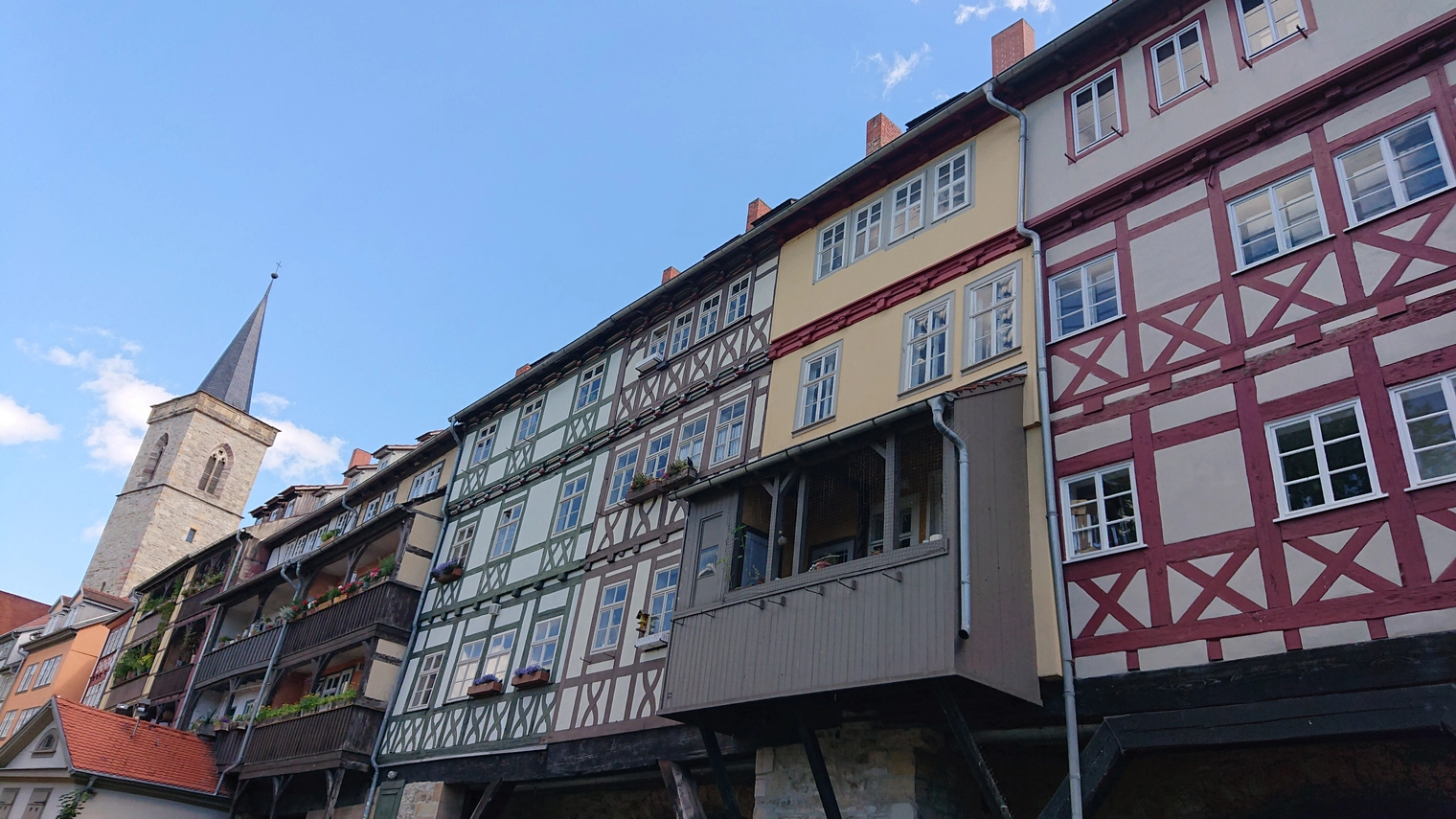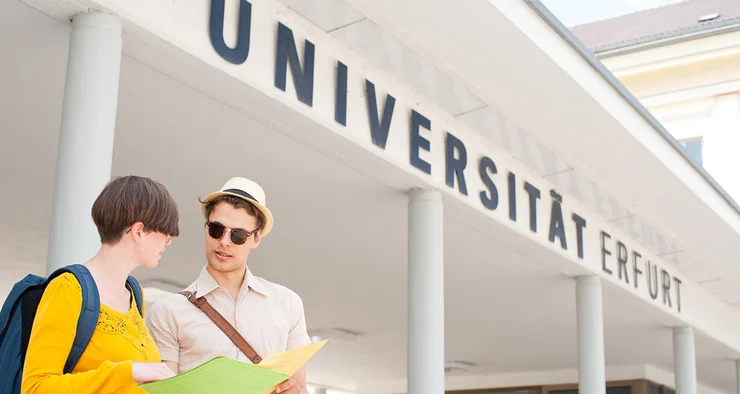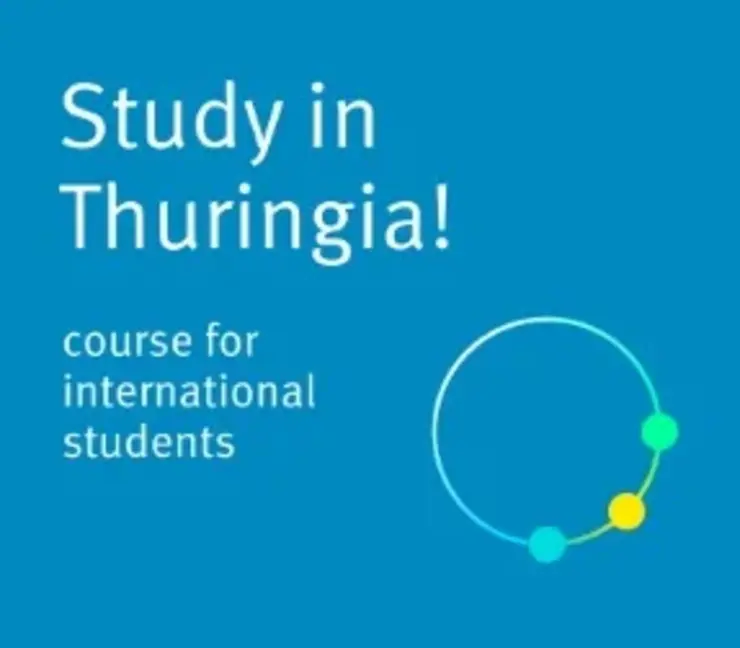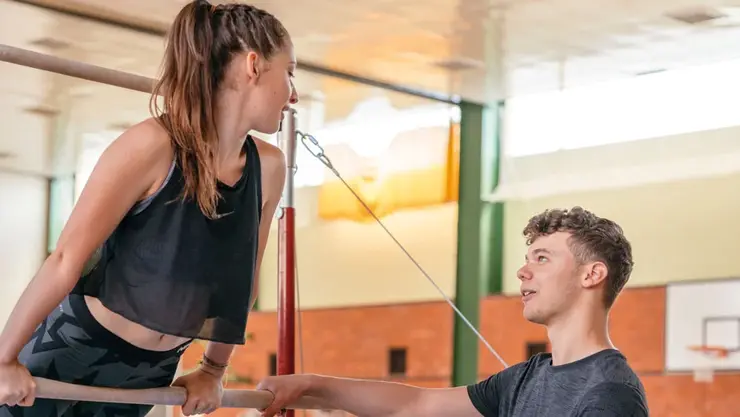Daily life in Erfurt
Erfurt - The city in the green heart of Germany

Please note: Once you watch the video, data will be transmitted to Youtube/Google. For more information, see Google Privacy.
Language advice
On campus, the languages of communication are German and English. In the city, on the other hand, the main language of communication is German. Once confronted with German on a daily bases, you will probably learn fast. However, it cannot hurt to learn as much German as possible before you come to Erfurt, for most study programs you will eventually need a high level of German. But even though you may be in Erfurt for only one or two semesters, good German skills will be a major advantage for your.
For enrolled students, the University of Erfurt Language Center offers free-of-charge German language courses during the semester.
You may also want to try language learning apps or join the Tandem program of the Language Center.
Join Student Associations

There are a variety of different student associations on the campus of the University of Erfurt. The associations cover topics such as society, politics and leisure. The members of the groups are looking forward to welcoming new dedicated students!
The student association International Campus Erfurt, for instance, regularly organizes events, often in cooperation with the International Office. aims to prevent any racist action on the campus of the university. ICE also organises the International Welcome Week twice each year when the semesters begin. You are warmly welcome to join ICE!
Students interested in music can join the University choirs like the Chamber Choir, the Jazz and Gospel Choir or the Academic Choir of Erfurt, even though they may not be majoring in Music.
Free courses about study life in Thuringia

In four thematic course blocks you will learn everything you need to know about studying in the heart of Germany. From initial issues of everyday communication and study organisation to questions on study financing and career planning - these free courses cover important topics for a successful start on your studies.
University Sports Centre (USV)

The University Sports Centre (USV) provides students and employees with the opportunity to increase their levels of fitness with a wide range of activities. The USV offers a wide range of both individual and team sports, for instance:
- Aerobics, Cardio, Gymnastics, Athletics, Swimming
- Basketball, (beach) volleyball, soccer, Handball, Table tennis
- Judo, Karate, self-defence, Aikido, Yoga
The offer is published on the university sports centre website and at the beginning of each semester. Registration is online during a certain period at the beginning of the semester.
Contact: info@usv.de
Health

Germany has a very good healthcare system and a dense network of doctors. It is not always easy to find your way around the German healthcare system, so we recommend that you find out more about it on these pages: Health - tips for everyday student life
If you are ill and need medical care, you can search for general practitioners, specialists and psychotherapists on the website of the Kassenärztliche Vereinigung Thüringen: Doctor search
The University of Erfurt cares about the health of its students and staff. Health days and other events are held regularly on campus: Information on university health management
Costs
Cost of living
Detailed Information on finances provides the Website of the DAAD. Please take the following costs into consideration:
- Rent for a room in a student residence hall or for private accommodation (prices may vary immensly)
- Security deposit for a room in a residence hall (300 Euro), which is returned after the lease has expired
- Semester contribution (approx. 300 Euro per semester) including the semester ticket, which enables travel free of charge on all local public transport in and around Erfurt
- Health insurance contribution
- Costs for books and learning materials
- Other everyday costs (e.g. groceries)
Keep in mind that you will need a big amount of money in cash at the beginning of your stay (room deposit, semester contribution, health insurance, phone card, shopping). Before you depart for Erfurt, inform your bank that you will be spending one or two semesters abroad and find out if there is a daily or weekly limit for withdrawals. Please bring enough cash.
Groceries
Prices for groceries are relatively moderate in Germany. For bio products you will usually have to calculate in more money.
Supermarkets are generally open from Monday to Saturday between 8:00 and 20:00. There are outlets with large supermarket chains at the terminus of tram number 6 (Rieth) and at the Thüringenpark tram stop of the number 3 tram (Europaplatz).
You can also buy good quality fresh fruit and vegetables at very reasonable prices at the local market on the Domplatz from very early on in the morning to approximately 13:30. In Germany, all shops are closed on Sundays. Petrol station shops and the shops near the train station are the only places that remain open during the night as well as on Sundays and public holidays.
Catering/canteens
One of the main tasks of the University's Studierendenwerk (Student Services Organisation) is to prepare and serve meals at reasonable prices. The students' meals in the "Mensa" (dining hall) are subsidised by the State of Thuringia. German and international food, including vegetarian, is served as the main meal and the standard menu. There are also salad and pasta buffets. In addition, various snacks can be purchased in the cafeterias: Mensen und Cafeterien.
Facilities and opening hours can be checked at the Student Services website.
Health insurance
Every student is required to have adequate health insurance coverage at all times. Documentation for health insurance must be provided when enrolling at the University. As a student, you have the right to statutory health insurance at the lowest rate of contribution.
The following health insurance options are available:
for students up to 30 years old: a health insurance contract with a general local health insurance fund at student rates
for students over 30: a health insurance contract with a private health insurer (Compare the prices of various statutory and private insurance companies for the best offer!)
The health insurance of certain countries with bilateral agreements with Germany is recognised in Germany so that it is possible for you to simply remain insured in your own country. You must obtain the form specified below from your domestic national insurance and present it to the german health insurance (as of 4/2017):
European Health Insurance Card (EHIC) from national health insurer (EU-countries; EEC-countries (Iceland, Liechtenstein, Norway); Switzerland)
BH 16 (Bosnia-Herzegovina)
JU 6 (Serbia, Montenegro)
RM/D 11 (Macedonia)
AT/11 (Turkey)
A/TN 11 (Tunesia)
Please note that travel insurances are not recognized in Germany. You will have to obtain German health insurance in order to be able to enroll.
Working/Jobs
International students who are staying in Erfurt for at least two semesters are legally allowed to work up to 120 full or 240 half days per year, mainly during the semester break. The authorisation is provided directly by the Foreigners' Registration Authority, so you do not need a work permit from the job centre. If you have received a scholarship for your studies, and want to earn extra money during your stay in Erfurt, you will need permission from the body providing you with the scholarship. You do not need permission for a job as a student assistant at the university.
It is not easy to find part-time jobs in Germany. However, with good language skills, particularly in German and English, and a little bit of luck, you could find a temporary job in fields such as typing, auxiliary work for companies, and part-time jobs in call-centres, factories or bars. The University's Studierendenwerk has set up a Student Job Agency in conjunction with the Erfurt Job Centre. In addition, the university itself employs students for temporary work.
In cooperation with the provider JobTeaser the Erfurt University's student council has implemented an online job and traineeship platform where you can register via an app. The platform's target groups are students, companies as well as teaching staff and employees. You can find this Career Center here.
Thüringer Agentur für Fachkräftegewinnung (ThAFF) assists students in finding an internship or a job after the completition of studies. It provides a database with available jobs.
The Welcome Center Thuringia provides skilled professionals from other countries with specific immigration assistance and integration support. It is the main point of contact for skilled foreign professionals who want to work and live in Thuringia, and for companies who want to hire and integrate these specialists into their workforce.
The web portal "Make it in Germany" warmly welcomes international qualified professionals and their families! Qualified professionals from abroad can use the welcome portal to find out more information on how to live and work in Germany - and why it is worthwhile to do so.
Every December, Thüringer Agentur für Fachkräftegewinnung organises the "academix" job fair. Students and graduates receive advice concerning application documents, internship positions, and job opportunities. It is recommended to attend academix at the beginning of your studies to get an overview and establish contact with companies. Please do not forget to take your application documents with you to the job fair.
Facts about Germany

Facts about Germany is a website offering all sorts of up-to-date information about Germany in general. All aspects of modern life in Germany are covered – be it business, culture, or politics. Available in German, English and 16 other languages. Check it out!
You are looking for general information about studying in Germany? Visit the websites of the German Academic Exchange Service (DAAD).
